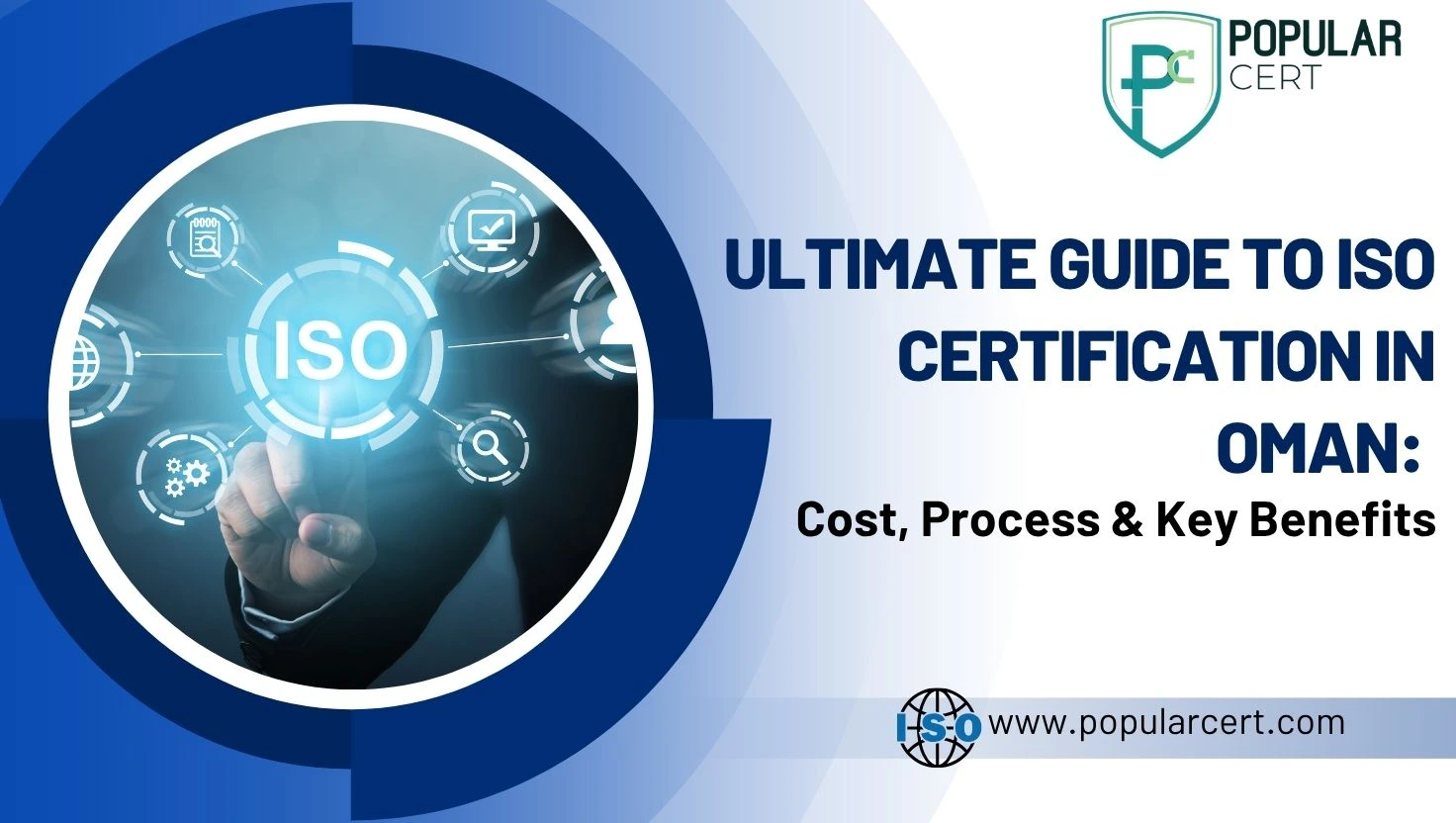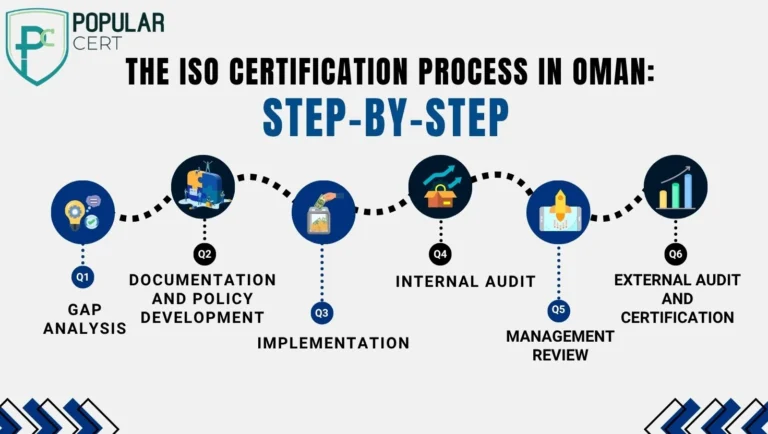Ultimate Guide to ISO Certification in Oman: Costs, Process & Benefits

Introduction – Why ISO Certification Matters in Oman
In today’s busy and rule-laden market, having ISO Certification Oman is more than a sticker on the wall; it works like a passport that opens doors to better business. Whether you oversee a manufacturing line in Sohar, an IT team in Muscat, or a fleet in Salalah, meeting these world-wide standards can lift your credibility, smooth your daily operations, and add to the final profit.
With Oman’s Vision 2040 pushing for innovation, green practices, and expanded trade, earning an ISO badge has quickly shifted from optional to important for firms that want to succeed at home and grow overseas. This guide looks at the whole picture—how the certification journey unfolds, what it costs, and the ways it can pay you back.What Is ISO Certification?
ISO, short for the International Organization for Standardization, is the global group that crafts voluntary standards to keep products, services, and systems safe, efficient, and predictable.
Common ISO Standards in Oman
Several ISO marks are appearing on Omani business certificates:
- ISO 9001—Quality Management Systems (QMS)
- ISO 14001—Environmental Management
- ISO 45001—Occupational Health & Safety
- ISO 27001—Information Security
- ISO 22000—Food Safety Management
- ISO 50001—Energy Management
These seals help your organization hit world honors and reassure customers and partners alike that you are serious about quality, safety, and responsible growth.
Multi-Site ISO Certification in Oman: How It Works
Many companies in Oman now run operations from several locations-Muscat HQ, Sohar factory, Salalah distribution hub-and that geography can make quality standards tricky. If your organization is spread out like this, a multi-site ISO certificate could save time and hassle.
How Its Done:
- One ISO certificate is issued for all the sites;
- Auditors pick a sample of branches to check, not everyone every time;
- Central functions, such as HR or purchasing, are looked at in the head office;
- Day-to-day work like production or delivery is reviewed right where it happens.
Key Benefits:
- It costs less than getting a separate certificate for each place
- You end up with the same procedures and controls everywhere
- When new branches open, adding them to the approval process is much simpler.
Popularcert has guided several Omani firms in building this joined-up quality or environmental system that stretches across their regions.
Types Of Certification
- ISO Certification
- ISO 9001 Certification
- ISO 14001 Certification
- ISO 45001 Certification
- ISO 22000 Certification
- ISO 27001 Certification
- ISO 17025 Certification
- ISO 13485 Certification
- ISO 20000-1 Certification
- ISO 22301 Certification
- ISO 50001 Certification
- ISO 37001 Certification
- IATF 16949 Certification
- ISO 29001 Certification
- ISO 31000 Certification
- ISO 20121 Certification
- ISO 10002 Certification
- ISO 41001 Certification
Get Free Consultation
Our Clients


















The ISO Certification Process in Oman: Step-by-Step
Getting ISO-certified in Oman follows a set path, but you can tailor each step to fit your company. Here’s how it generally works:

- Gap Analysis
A quick look at what you currently do beside the ISO rules. It spots weak spots that need fixing or just better paperwork. Doing this first stops costly rewrites later.
- Documentation and Policy Development
Write the quality manual, procedures, policies, and handy forms. Everything must match how your firm works and still stay within ISO lines.
- Implementation
Roll out the written guides in every team. Talk to staff, train them, and answer questions so the change feels natural.
- Internal Audit
A friendly check to see if daily work matches the papers. It finds any slip-ups and shows what to fix before the big review.
- Management Review
Senior leaders sit down with the audit report. They make sure the system fits the company goals and that money, time, and people are ready for the outside examiner.
- External Audit and Certification
A chosen, neutral firm visits to give the final nod. The review usually comes in two parts:
- Stage 1 Audit :They read the documents.
- Stage 2 Audit :They walk the floor and chat with staff.
Pass both, and you get a three-year certificate, plus short checks every year.
Popularcert guides Omani firms through all these steps, so you avoid mistakes and keep the process moving smoothly.
ISO Certification Cost in Oman: What to Expect
As with most projects, the final bill for ISO certification can swing wildly based on a handful of key factors. Understanding those pieces will help you budget more accurately.
Key Cost Influencers:
- Size of your company:The size of your company-footprint, head count, and number of sites
- Industry type:The industry you sit in-safety-sensitive fields like food, health, and oil & gas usually face tougher checks
- Scope of certification:The scope you choose-one standard, like ISO9001, or a bundle of them
- Current Compliance Level: Whether you already have documentation or are starting from scratch, an honest self-assessment shows exactly how much work remains.
- Consulting Needs: Decide if your team has the time, or whether you benefit from in-house support or external experts like Popularcert, who can jump in quickly.
- Audit Duration and Body: Remember that accredited certifiers tend to charge more, yet their global stamp opens wider doors for future business.
Tip: Always choose a reputable, accredited partner; a cheaper badge today could haunt you tomorrow, putting tenders or contracts at risk.
Benefits of ISO Certification for Businesses in Oman
ISO certification is more than paperwork; for companies in Oman, it leads to smoother operations and stronger profitability.
-
Competitive Advantage
- It earns instant respect with local buyers and overseas partners.
- It meets most tender requirements from public and private customers. -
Improved Operational Efficiency
- Clear, written procedures reduce mistakes, waste, and costly holdups.
- Keeping score on key metrics uncovers problems and fuels steady gains. -
Regulatory Compliance
- Lots of ISO clauses echo Omani law, so compliance gaps close early.
- Stronger controls slash the risk of fines, lawsuits, or surprise audits. -
Enhanced Customer Satisfaction
- A quality framework like ISO 9001 turns customer feedback into action.
- Reliable products and services build trust and deepen brand loyalty. -
Employee Engagement & Safety
- Standards such as ISO 45001 spot and remove workplace hazards first.
- Safer environments boost morale, lower absenteeism, and retain top talent. -
Global Expansion Opportunities
- International buyers and investors pick ISO-certified firms first.
- Certification opens new markets with far lower entry barriers.
Choosing the Right ISO Consultant in Oman
Hiring the right consultant will shape your entire ISO journey, so choose wisely. Focus on a partner who brings:
- Local expertise, meaning someone who understands Oman’s laws, customs, and daily business culture.
- Deep ISO-accreditation knowledge, with a team that regularly works alongside IAF and IAS-recognised bodies.
- Customizable packages that fit your industry needs and budget, rather than forcing you into a standard set.
- A strong client portfolio and credible reviews, showing proven results in oil-and-gas, logistics, healthcare, construction, and IT.
Why Choose Popularcert?
Popularcert has earned its spot as one of Oman’s leading ISO firms because we deliver:
- End-to-end support, guiding you through gap analysis, procedure writing, staff training, and the final audit.
- Affordable packages designed especially for startups and SMEs.
- A widespread presence in Muscat, Sohar, Salalah, and Duqm, so we meet you where your business is.
- A 100-percent success rate in first-round certification approvals.
Real-World Use Case: ISO 9001 in Oman's Logistics Sector
When a mid-sized logistics firm in Sohar aimed for ISO 9001 to raise service quality and attract global clients, it turned to us. We designed a tailored quality management system, trained more than 40 staff, and secured certification in under eight weeks. The company then won a key port contract and, in the first quarter after certification, cut customer complaints by 30 percent.
ISO Certification Supports Oman Vision 2040
Oman Vision 2040 sets a clear target: build a balanced, knowledge-driven economy powered by innovation, sustainability, and worldwide benchmarks. In that context, getting ISO certified moves the agenda forward in practical ways.
- Economic Diversification firms adopting ISO practices tap into new growth areas-renewable energy, e-commerce, smart manufacturing- and position themselves alongside global players.
- Regulatory Compliance and Governance Standards such as ISO 37001 for anti-bribery and ISO 27001 for information security strengthen ethical behavior and digital trust-two corners of the Vision 2040 plan.
- Enhancing Export Readiness Exporters who can show ISO badges reassure international buyers, opening doors in the EU, GCC, and emerging markets where quality proof counts.
Tip: Because growth programs often link to certification, banks and free zones now list ISO status as a must-have for trust stamps or incentives.
Conclusion - Your Path to Global Standards Starts Here
In Oman, earning an ISO Certification stamp used to be a bonus badge; now its practically mandatory for anyone serious about business. Saying yes to the standard tells your customers you’ll deliver quality, sharpens how your team works every day, and cracks open markets that still stack paperwork before they sell. From a cozy café in Nizwa to a sprawling plant in Duqm, the ISO blueprint gives you clearer procedures and a fresh shot of confidence.
The initial spend is small compared to the gains you’ll see in speed, trust, and new revenue streams. Add Popularcert as your partner, and the journey becomes faster, cheaper, and almost headache-free.
So, are you ready to lock in your ISO badge in Oman?
With Popularcert, you get speedy, friendly, and wallet-wise ISO certs done the Omani way. We check your gaps, draft the papers, train your crew, and run the final audit, tailoring every task to your size and field.
Contact Popularcert today for a free chat and a no-surprise quote.
Let’s team up and build a brighter, certified tomorrow together.
GET A FREE CONSULTATION NOW
FAQs
What is the ISO certification process for businesses in Oman?
It includes gap analysis, documentation, training, audits, and certification by an accredited body. The process ensures your systems align with ISO standards.
How much does ISO certification cost in Oman?
Costs typically range from OMR 800 to 3000+, depending on your company size, scope, and chosen ISO standard.
How long does it take to get ISO certified in Oman?
It usually takes 4 to 12 weeks, based on your organization’s readiness and the complexity of your operations.
Is ISO certification mandatory for businesses in Oman?
It’s not mandatory by law, but often required for tenders, partnerships, and market credibility.
Which ISO standard should I choose for my business in Oman?
It depends on your industry—ISO 9001 for quality, 27001 for IT, 14001 for environment, and so on.
